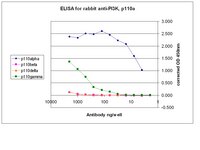09-481 Sigma-AldrichAnti-PI3 Kinase Antibody, p110α
Detect PI3 Kinase using this Anti-PI3 Kinase Antibody, p110α validated for use in WB, IP, IH, ELISA.
More>> Detect PI3 Kinase using this Anti-PI3 Kinase Antibody, p110α validated for use in WB, IP, IH, ELISA. Less<<Recommended Products
Overview
| Replacement Information |
|---|
Key Spec Table
| Species Reactivity | Key Applications | Host | Format | Antibody Type |
|---|---|---|---|---|
| H, R | WB, IP, IHC, ELISA | Rb | Affinity Purified | Polyclonal Antibody |
| References |
|---|
| Product Information | |
|---|---|
| Format | Affinity Purified |
| Presentation | Purified rabbit polyclonal in buffer containing 0.1 M Tris-Glycine (pH 7.4), 150 mM NaCl, and 0.05% sodium azide. |
| Quality Level | MQ100 |
| Physicochemical Information |
|---|
| Dimensions |
|---|
| Materials Information |
|---|
| Toxicological Information |
|---|
| Safety Information according to GHS |
|---|
| Safety Information |
|---|
| Storage and Shipping Information | |
|---|---|
| Storage Conditions | Stable for 1 year at 2-8ºC from date of receipt. |
| Packaging Information | |
|---|---|
| Material Size | 100 µg |
| Transport Information |
|---|
| Supplemental Information |
|---|
| Specifications |
|---|
| Global Trade Item Number | |
|---|---|
| Catalogue Number | GTIN |
| 09-481 | 04053252363818 |
Documentation
Anti-PI3 Kinase Antibody, p110α SDS
| Title |
|---|
Anti-PI3 Kinase Antibody, p110α Certificates of Analysis
| Title | Lot Number |
|---|---|
| Anti-PI3 Kinase, p110a - 2179367 | 2179367 |
| Anti-PI3 Kinase, p110a - NG1618266 | NG1618266 |
| Anti-PI3 Kinase, p110a - NG1661341 | NG1661341 |
| Anti-PI3 Kinase, p110a - NG1734871 | NG1734871 |
| Anti-PI3 Kinase, p110a - NG17490006 | NG17490006 |
| Anti-PI3 Kinase, p110a - NG1809731 | NG1809731 |
| Anti-PI3 Kinase, p110α - 2411905 | 2411905 |
| Anti-PI3 Kinase, p110α - 2441452 | 2441452 |
| Anti-PI3 Kinase, p110α - 3212770 | 3212770 |
| Anti-PI3 Kinase, p110α - 3698142 | 3698142 |
Brochure
| Title |
|---|
| Advancing cancer research: From hallmarks & biomarkers to tumor microenvironment progression |













